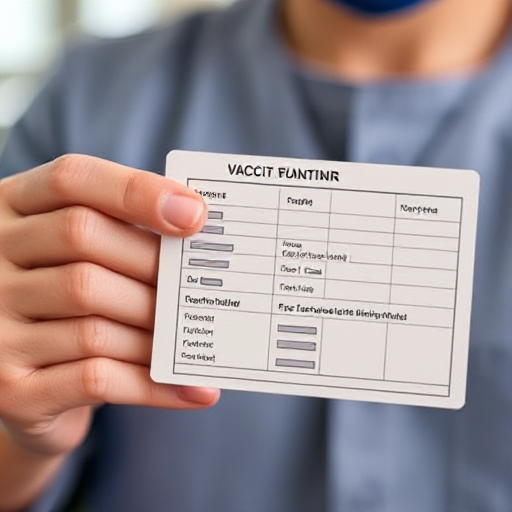Vaccination Verification: Ensuring Health Security
Vaccination verification is the process of confirming an individual’s vaccination status, typically for diseases like COVID-19, to ensure public safety. It involves checking records from healthcare providers or government databases that indicate an individual has received a specific vaccine. This process may be required for entry into certain places, travel, or employment, ensuring individuals are protected against contagious diseases. In some cases, digital certificates or QR codes are used for easy verification. The importance of vaccination verification lies in reducing transmission rates and protecting vulnerable populations by ensuring those who interact in high-risk settings are properly immunized.
Vaccination Verification: All Detail
The vaccination verification process can take different forms depending on the purpose, location, and technology available. These verification methods help ensure that individuals are properly vaccinated, and they are typically required for travel, entry to specific venues, employment, or health protocols. Below are the most common forms of verification:
1. Physical Vaccination Cards
One of the traditional and most widely recognized forms of verification is the physical vaccination card. Issued by healthcare providers, these cards typically include essential information such as:
- The type of vaccine received
- The dates of vaccination doses
- The healthcare facility or provider's details These cards serve as proof of vaccination and can be shown when requested. However, physical cards are susceptible to being lost or damaged, and their authenticity can sometimes be questioned without proper documentation.
2. Digital Vaccination Certificates
As digital technology has advanced, many countries and organizations have shifted to issuing digital vaccination certificates. These certificates are often provided in the form of:
- QR codes
- Digital health passports They contain the same information as physical cards but are stored electronically, allowing for quicker and easier access. Digital certificates are more secure, as they can be encrypted to prevent fraud. They can be stored on mobile phones or accessible through government or healthcare apps, enabling smooth verification when traveling, entering public spaces, or attending events.
3. Mobile Apps and Health Passports
Mobile apps have become a vital tool for vaccination verification. Many countries and organizations have developed health passport apps that integrate vaccination records with other health data, such as test results and medical history. These apps, such as the EU Digital COVID Certificate or the CommonPass app, allow individuals to:
- Upload their vaccination status
- Display their vaccination history in a secure digital format
- Verify their status via a QR code or barcode These apps are often used in travel, especially for international flights or crossing borders, where governments require real-time verification of an individual’s vaccination status.
4. Blockchain Technology
Some organizations and governments have explored the use of blockchain technology for vaccination verification. Blockchain can provide a secure, tamper-proof ledger that stores vaccination records in a decentralized manner. Each transaction or update is recorded in a way that cannot be altered, providing an added layer of security and trust. Individuals can then access their vaccination data through a secure digital wallet that’s tied to the blockchain, ensuring both privacy and integrity.
5. Paper-Based Health Records
In many regions where digital infrastructure is limited or unavailable, paper-based health records are still in use. These records, provided by healthcare providers, can include details of vaccinations and be presented to authorities as proof of immunization. While functional, this system can be slower and more vulnerable to loss, theft, or falsification. Paper records also require manual verification and cannot provide the speed or convenience of digital methods.
6. Government Databases
Many governments maintain centralized vaccination databases, which store comprehensive immunization data for their citizens. This information can be accessed by individuals or verified by authorized personnel through online portals or by contacting local health departments. These databases often serve as the official record of vaccination status and can be used for various purposes, such as confirming eligibility for specific services or events.
7. Employer or Venue-Specific Verification Systems
In some cases, employers, event organizers, or venue managers create their own vaccination verification systems. For example, employers may ask staff to submit proof of vaccination via email, upload documents to internal portals, or use apps tailored for their industry. Similarly, venues or event organizers may require proof of vaccination through an app, a physical document, or a QR code before entry, especially in sectors like entertainment, travel, or healthcare.
8. Test and Trace Systems
In conjunction with vaccination verification, many countries have implemented test and trace systems that require individuals to show proof of a negative test result, along with vaccination documentation, before accessing certain places or events. This system is used in combination to enhance public safety by providing dual protection: vaccination and testing.
9. Third-Party Verification Services
Third-party organizations or private entities, including travel agencies, healthcare providers, and technology companies, often offer vaccination verification services. These services verify vaccination data and provide individuals with digital certificates or QR codes. This method is often used for travel, where official health documents from trusted sources are required to facilitate cross-border movement.
Conclusion:
Vaccination verification ensures that individuals have received the necessary immunizations to protect public health. While physical vaccination cards remain in use, digital verification methods such as QR codes, health passport apps, and blockchain-based solutions are becoming increasingly popular due to their efficiency, security, and convenience. Each method has its own advantages and is chosen based on factors like technological infrastructure, geographical location, and the purpose of verification.
A vaccination requirement refers to the mandate that individuals must receive a specific vaccine to participate in certain activities, such as travel, employment, or attending events. It ensures public health safety by reducing the spread of contagious diseases.





.jpg)
Comments
Post a Comment